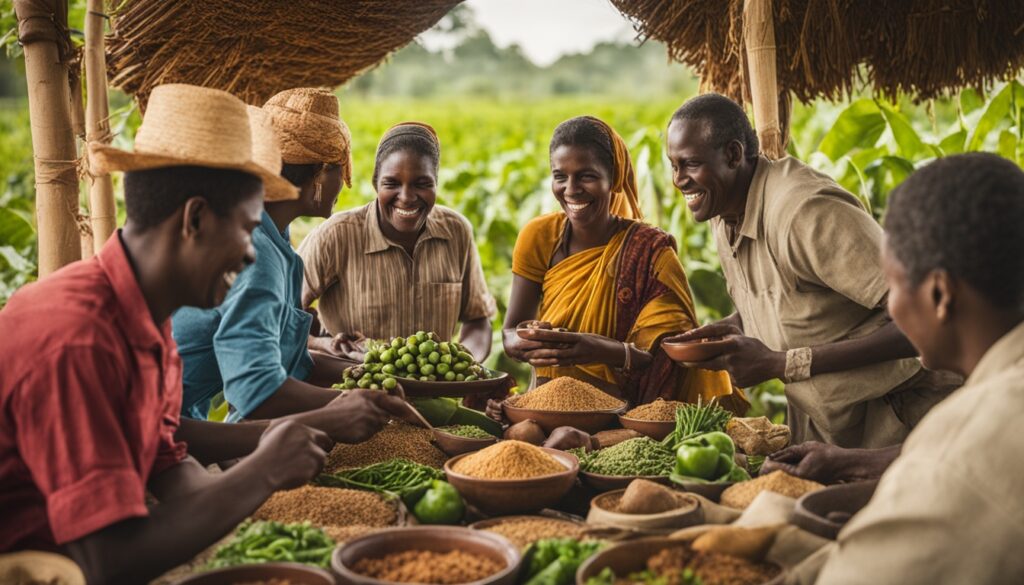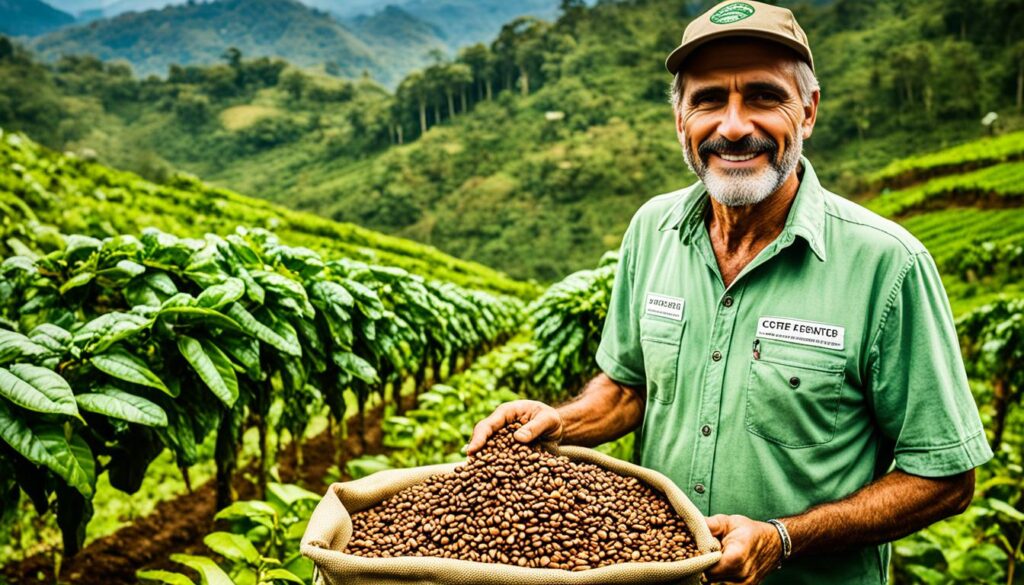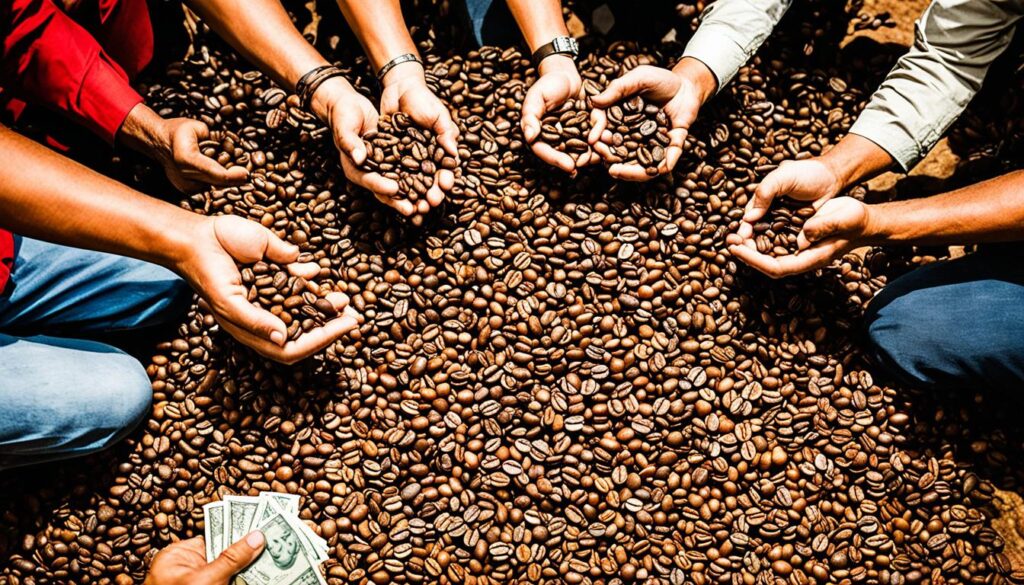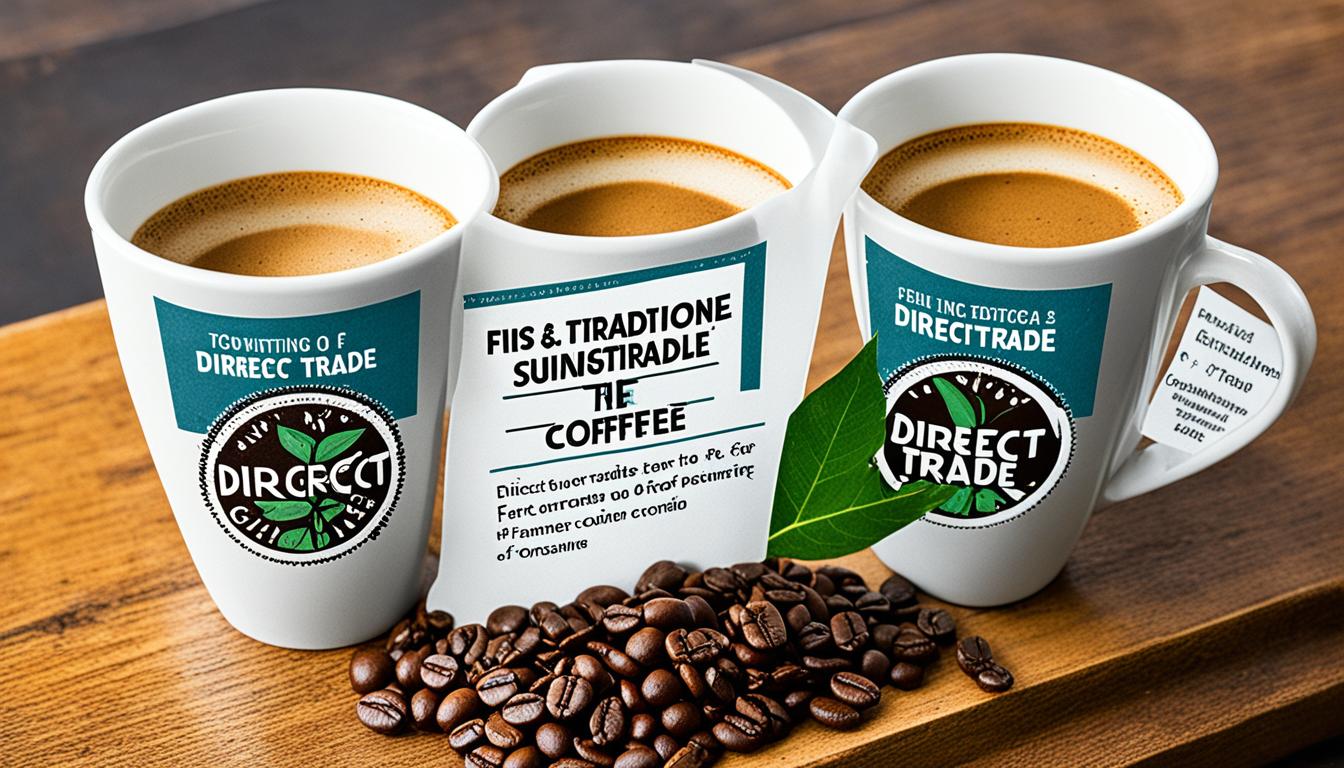Did you realize that coffee farmers typically receive less than 8% of the amount you spend on coffee? This highlights the importance of purchasing coffee through ethical means that provide farmers with a fair portion. Coffee primarily originates from regions such as Africa, Southeast Asia, and Central and South America. Understanding the journey of coffee to reach us is crucial now more than ever.
As coffee industry grows, two main ways stand out: fair trade and direct trade. Both aim to make things fair, sustainable, and better for coffee growers. They do this in different ways. Learning about these ways helps us choose our coffee better and support hardworking farmers.
Key Takeaways
- Small-scale coffee farmers often earn less than 8% of the final consumer price.
- Fair Trade certification can ensure stable pricing but faces criticism regarding distribution and quality.
- Direct Trade fosters direct relationships between farmers and buyers, often resulting in better prices for farmers.
- Both Fair Trade and Direct Trade aim to improve farmer livelihoods but through different methodologies.
- Ethical sourcing decisions can impact farmers significantly, making consumer awareness crucial.
Understanding Fair Trade Coffee
Fair trade coffee stands for buying and selling that is fair and helps farmers. It lets farmers in poorer countries get a fair price for their coffee. This system is all about fairness, caring for the environment, and helping communities grow. Making coffee Fair Trade Certified is key to support sustainable farming and ensure farmers follow important rules.
What is Fair Trade Coffee?
Fair trade coffee comes with a special promise that farmers get paid fairly. It’s about doing business in a way that is right, helps fix money problems, and supports local communities. By being certified, farmers can reach new markets easily and stay safe from big price changes.
Who Oversees Fair Trade Certification?
Fairtrade International and Fair Trade USA are in charge of fair trade coffee certification. These groups set the rules that coffee producers must follow to be Fair Trade Certified. This includes meeting standards that are good for money matters, society, and the planet. It makes sure that money earned is shared fairly with the farmers’ groups.
Benefits of Fair Trade Coffee
- Guaranteed better pay helps improve farmers’ lives.
- Money is put into projects that help local communities grow.
- Supports farming that is friendly to the environment.
- Gives producers who are often overlooked a chance to reach worldwide markets.
- Makes shoppers more aware of the importance of buying ethically.
Challenges Facing Fair Trade Coffee
While fair trade helps a lot, it’s not perfect. Small farmers often find the costs of certification too high. There’s not always enough demand for fair trade products, which slows down its growth. New farmers might get confused by all the rules, and changing prices is still a big problem. Getting into the market and keeping the trust in the certification process are also issues.

Understanding Direct Trade Coffee
Direct trade coffee is all about making a strong connection between coffee roasters and producers. It gets rid of the middlemen. This makes sure everyone gets a fair deal, especially for high-quality coffee. Roasters work closely with farmers. They create deals that are good for both sides, focusing on quality and sustainability.
What is Direct Trade Coffee?
With direct trade, roasters and producers make deals directly. This system helps farmers get better prices for their coffee. It’s all about being open and building trust. Without middlemen, farmers end up making more money.
Benefits of Direct Trade Coffee
Direct trade coffee provides several notable advantages, including:
- Higher Compensation: Farmers often receive more favorable prices due to the elimination of intermediaries.
- Transparency in the Supply Chain: Direct communication facilitates a better understanding of sourcing practices and quality standards.
- Quality Control: Roasters can establish direct relationships that help them ensure superior quality coffee.
- Sustainable Practices: Collaboration between roasters and farmers can lead to improved farming methods and increased yields.
Challenges of Direct Trade Coffee
While the direct trade model offers numerous benefits, it is not without its challenges:
- Market Demand: Inconsistent demand can pose difficulties for farmers relying solely on direct trade practices.
- Relationship Dependency: The model’s success often hinges on maintaining strong relationships, which may be vulnerable to changes.
- Verification of Ethics: Without formal certification, consumers may find it harder to assess the ethicality of direct trade practices.

Fair Trade vs. Direct Trade Coffee: What’s the difference?
Fair trade and direct trade coffee focus on ethical sourcing. They support coffee farmers in different ways. Understanding their differences helps us choose wisely.
Comparison of Relationship Dynamics
Fair trade involves cooperatives and certification. It sets a minimum price, promoting community unity. However, it can distance farmers from buyers.
Direct trade brings buyers and farmers close. Farmers negotiate prices directly, strengthening their ties. It values trust and cooperation.
Impact on Pricing and Earnings for Farmers
Fair trade ensures a minimum price, providing a safety net. But it may cap farmers’ earnings when market prices rise.
In direct trade, farmers often get higher prices. This leads to better earnings, making it a preferred model for many.
Certification vs. Transparency in Sourcing
Fair trade certification follows strict standards. Yet, it can be tough for small farmers due to costs.
Direct trade is about open relationships. Buyers and producers work closely, allowing for flexible pricing.

| Aspect | Fair Trade | Direct Trade |
|---|---|---|
| Relationship Dynamics | Involves cooperatives and certification | Direct connections between producers and buyers |
| Pricing Strategies | Minimum price guarantee | Negotiated prices for higher earnings |
| Earnings for Coffee Farmers | Stable but potentially limited increases | Higher potential earnings with direct negotiations |
| Certification | Standardized, third-party certified | Relies on trust and direct relationships |
| Focus | Standardized products like coffee and tea | Specialty and high-end products |
Market Impact of Fair Trade and Direct Trade
The coffee industry is changing because people care more about where their coffee comes from. They prefer coffee that helps farmers have a stable income. This is changing not just what people buy but the whole demand for coffee.
Consumer Awareness and Preferences
People are paying more attention to where their coffee comes from. They choose coffee that matches their beliefs. This helps farmers earn a better living because people want to buy coffee that supports fair pay and looks after the planet.
Economic Viability of Coffee Farmers
Farmers’ earnings depend on how much coffee people want and how it is bought. Fair trade helps make sure farmers get paid a minimum amount. However, global market changes can still affect them.
Direct trade lets farmers and buyers work closely. This helps farmers get paid more without middlemen. But, how much this helps them can vary with each roaster’s approach.

| Aspect | Fair Trade | Direct Trade |
|---|---|---|
| Certification | Regulated by Fair Trade USA and Fairtrade America | No standardized certification system |
| Pricing Model | Minimum price guarantee | Negotiated prices directly with farmers |
| Quality Control | Complex adherence to standards | Direct relationships allow for tailored quality control |
| Impact on Livelihoods | Ensures fair wages but may limit participation due to costs | Potential for higher earnings based on quality |
| Transparency | Structured with certification criteria | Varies by roaster practices |
Market demand and how coffee is sourced both play big roles in farmer earnings. When people choose ethically sourced coffee, they help make the coffee market fairer for farmers.
How to Choose Between Fair Trade and Direct Trade
When picking coffee, think about what you value and like. Start by learning the difference between fair trade and direct trade. Each has its own benefits, impacting taste and the ethics of where it comes from.
Consider Your Values
For many, the ethics of coffee sourcing matter a lot. Fair trade aims to pay farmers enough to live on. But, money goes to groups, not directly to farmers. This can make it unclear how much farmers actually get.
Direct trade cuts out the middleman, so farmers can earn more. Firms like Mavuno Harvest switched to direct trade for closer ties with suppliers. This method supports fairer pay decided by the farmers. It leads to a supply chain that’s better for everyone.
Flavor Profiles and Quality Assurance
The taste of fair trade and direct trade coffee can be quite different. This is due to how each is sourced. Fair trade coffees, like the Downtown Blend, come from farmer groups and show their commitment to quality.
Direct trade coffees, like Panama Gesha Lot 290, highlight unique traits from specific farms. Direct trade can react faster to the market, often offering fresher, more distinct flavors. Consider this when choosing your coffee.

Conclusion
Fair trade and direct trade both aim to make coffee sourcing better. Fair trade guarantees farmers a minimum price. Right now, it’s $1.80 per pound. But getting certified is hard, and not all coffee is fair trade. This can limit how much farmers earn.
Direct trade, on the other hand, lets roasters and farmers work closely. They can agree on prices directly. This often means farmers get paid more. It also encourages farming practices that are good for the environment.
Why do our choices as consumers matter? They help shape a better coffee industry. When we understand the difference between fair trade and direct trade, we can choose to support farmers. Our decisions can push for coffee that is good for both people and the planet.
This is a hopeful time. More and more people are learning about how their coffee is sourced. Choosing coffee with a purpose means we help farmers get fair pay. It also helps their communities flourish.









